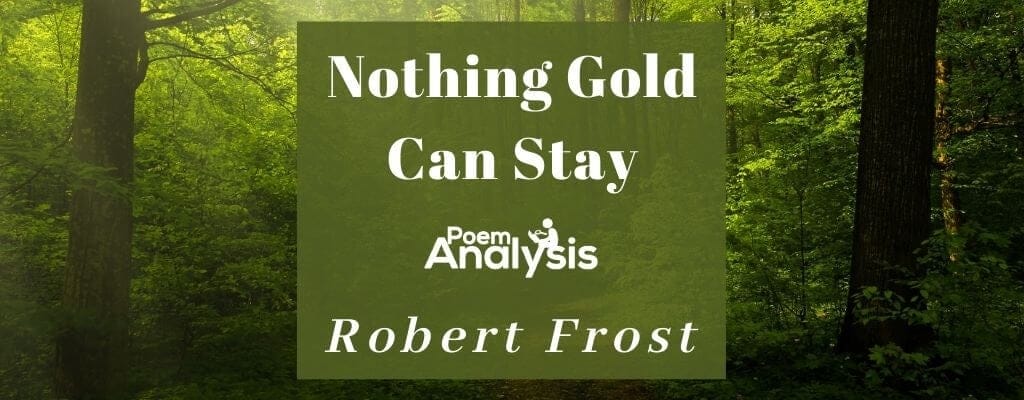Frost is saying that all things fade in time, and that is partly what makes them beautiful. This poem is a very famous example of Frost’s verse, and for good reason. It demonstrates Frost’s ability to condense profoundly important themes into just a few lines and words. The poem deals with themes of impermanence and change, focusing on how temporary and truly beautiful things are.
To better understand this poem, readers should pay attention to the poet's use of symbolism and how nature is used throughout the poem as a metaphor. The poet mentions elements that are meant to symbolize youth, newness, and change. You might want to think about how natural processes mirror changes.
Nothing Gold Can Stay Robert FrostNature's first green is gold,Her hardest hue to hold.Her early leaf's a flower;But only so an hour.Then leaf subsides to leaf.So Eden sank to grief,So dawn goes down to day.Nothing gold can stay.
Structure and Form
‘Nothing Gold Can Stay’ is an example of how Robert Frost used common American and rural imagery to discuss complex topics. There are no words in this piece with more than three syllables, for instance.
Even the rhyme scheme is simplistic. The rhymes come at the end of each line in couplets, following a pattern: aa, bb, cc, dd.
Theme
The central theme of this poem focuses on the idea of nature’s most beautiful elements as the briefest and most important. The poem uses a metaphor of the early leaves of spring changing in order to demonstrate this. The poet also reflects on how the most perfect moments or things cannot be preserved forever.
Literary Devices
In this poem, the poet uses a few different literary devices. These include:
- Alliteration: This can be seen when the poet repeats the same consonant sound at the beginning of multiple words. For example, “green” and “gold” in line one.
- Metaphor: This poem is a metaphor for the changing nature of beauty. The green of nature is immediately compared to gold in the first line.
- Symbolism: This literary device is seen when the poet uses an image to symbolize a deeper meaning. For example, gold is used to symbolize beauty and value.
Detailed Analysis
Line 1
Nature’s first green is gold,
‘Nothing Gold Can Stay’ begins with a simple statement. I believe that ‘Nature’s first green’ refers to spring. The poet is saying that the commonly accepted beauty of the first buds of green shooting up after a long winter is worth as much as gold. It is a fleeting beauty; the seasons will inevitably march on. The soft beauty of spring soon fades to summer and beyond.
Line 2
“Her” refers to nature, often personified as a woman or mother. The “hue” is of course, “green,” as explained in the first line. The second explains that the green of spring cannot last. In summer, the fields dry to brown. In fall, the leaves wither, change colors, and fall to earth. In winter, life is buried under a sea of white. It is impossible to keep a plant green forever, as any gardener knows.
Line 3
Her early leaf’s a flower;
This line of ‘Nothing Gold Can Stay’ is both a statement of fact and a metaphor. Obviously, in spring, the trees will bud and flower before growing back their leaves. In that literal respect, the statement is completely accurate.
Metaphorically, the writer is saying that the earliest leaves are as beautiful as a flower. In other words, spring itself is lovely as a flower.
Line 4
This line refers to “her early leaf” from the preceding one. On the literal level, the reader knows that the springtime blossoms last more than a mere hour. Metaphorically, that early beauty endures for such a brief and fleeting time that it could seem like it only really lasts for an instant.
Line 5
Then leaf subsides to leaf.
Here, the writer is describing the replacement of the first blossoms of spring. As mentioned above, nature adheres to a strict pattern. Plants sprout, bud, grow, wither, and die. Each part of the cycle brings a new aesthetic that is both new and familiar, different and the same.
Line 6
In this line, the poet invokes the biblical Garden of Eden to further illustrate his point. As nature slowly progressed from spring to winter, so did Eden go from the cradle of humanity to a place in distant memory.
Eden is a metaphor for both beauty in general and the perfect epitome of nature. Both of these ideas are fleeting and cannot last forever.
Line 7
So dawn goes down to day.
The inevitability of decay is emphasized in this line. Just as the dawn, beautiful and unique, must always give way to daylight, beauty must always be replaced by something else. Frost is saying that sunrise is only a temporary, limited time. All things must also be as limited.
Line 8
Nothing gold can stay.
In the final line, the poet drives home his point. “Gold” is a symbol of all things beautiful, important, and valued. He is saying that gold does not last forever. He believes that this is true of all things found in nature. Trees, streams, oceans, mountains, and even the sun and stars: nothing is constant. All things change. All things fade to nothing.
Historical Context
Frost is one of the most famous and honored poets in American history. He often employed scenes from rural New England in his poems, using them to discuss complex philosophical topics. In ‘Nothing Gold Can Stay’, for instance, the poet uses the shifting of the seasons to comment on the fleeting nature of life and beauty.
The poem was first published in 1924. It later appeared in a collection of Frost’s work that earned him a Pulitzer Prize. The poem went through a few different versions and edits as well. The version discussed above is widely recognized to be the most complete.




i disagre!!!
With what?